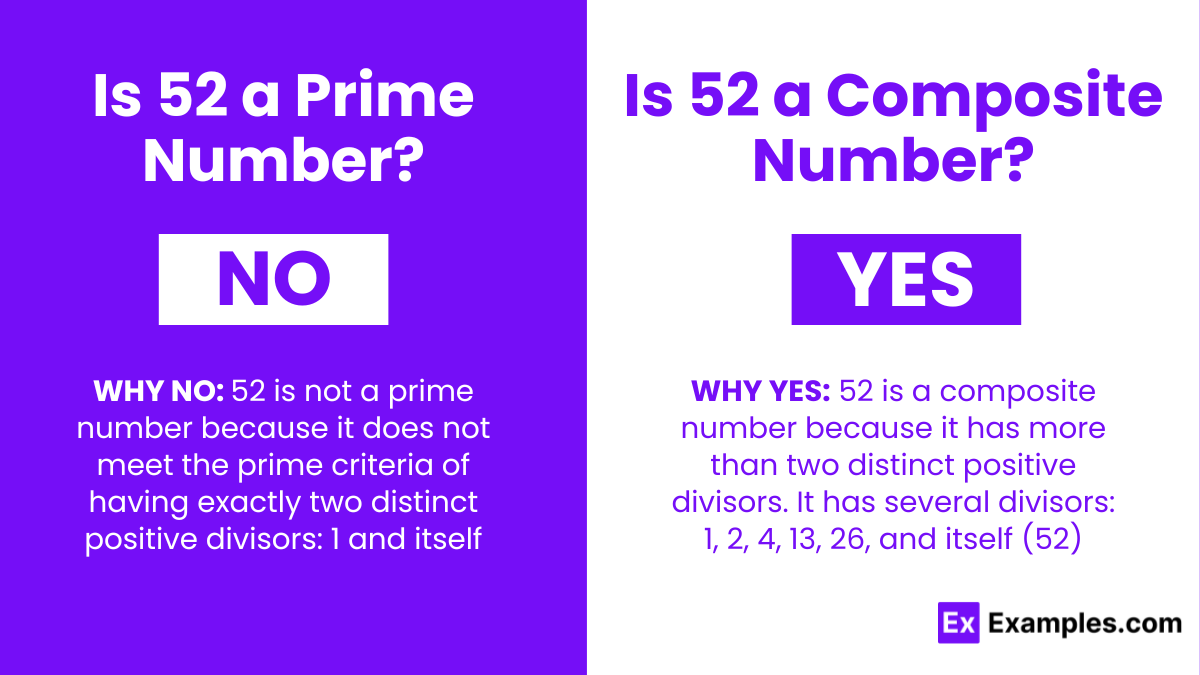Is 52 a prime number or a composite number?
Prime
Composite
Neither
Both


Why No: 52 is not a prime number because it does not meet the prime criteria of having exactly two distinct positive divisors: 1 and itself. Instead, 52 has divisors 1, 2, 4, 13, 26, and 52.
Why Yes: 52 is a composite number because it has more than two distinct positive divisors. It has several divisors: 1, 2, 4, 13, 26, and itself (52).
| Property | Answer |
|---|---|
| Is 52 a prime number? | No |
| Is 52 a composite number? | Yes |
| Is 52 a perfect square? | No |
| Factors of 52 | 1, 2, 4, 13, 26, 52 |
| Multiples of 52 | 52, 104, 156, 208, 260, 312, 364, 416, 468, 520 |
| Cube Root of 52 | Not a whole number |
| Square of 52 | 2704 |
| Square Root of 52 | Not a whole number (Approximately 7.211) |
| Is 52 a Perfect Cube? | No |
| Is 52 an Irrational number | No |
| Is 52 a Rational number | Yes |
| Is 52 a Real number | Yes |
| Is 52 an Integer | Yes |
| Is 52 a Natural number | Yes |
| Is 52 a Whole number | Yes |
| Is 52 an Even or odd number | Yes (52 is an even number) |
| Is 52 an Ordinal number | Yes |
| Is 52 a Complex number | Yes (as all real numbers are also complex numbers) |
The factors of 52, which are the numbers that evenly divide into it without leaving a remainder, include 1, 2, 4, 13, 26, and 52 itself.
52 is recognized not as a prime number but as a composite number because it has divisors other than 1 and itself, specifically 1, 2, 4, 13, 26, and 52. This distinguishes it from prime numbers, which have exactly two distinct positive divisors. While the number 52 may not be as frequently associated with harmony or spiritual significance in various cultures as some numbers, it serves as a reminder of the diversity and utility of numbers in mathematics. Its status as a composite and even number underscores the variety of numerical properties and their applications in different fields, highlighting the integral role of mathematics in understanding the world around us.
The nearest prime numbers to 52 are 53, which is just one number greater, and 47, which is five numbers less. Among these, 53 is the closest prime number to 52.
The prime factors of 52, which break it down to its basic prime number multipliers, are 2, repeated twice (squared), and 13, highlighting its fundamental prime components.
No, 52 is not a perfect square. A perfect square is a number that can be expressed as the product of an integer with itself, and 52 does not meet this criterion.
The factor pairs of 52, representing two numbers multiplied to get 52, are (1, 52), (2, 26), and (4, 13), showcasing the combinations of its divisible counterparts.
Text prompt
Add Tone
10 Examples of Public speaking
20 Examples of Gas lighting
Is 52 a prime number or a composite number?
Prime
Composite
Neither
Both
Which characteristic confirms that 52 is a composite number?
It has exactly two distinct positive divisors.
It is divisible by numbers other than 1 and itself.
It is greater than 50.
It can be divided by 2.
What is the smallest prime number that divides 52?
2
3
5
7
Which of these numbers is not a factor of 52?
2
4
13
17
If a number can be divided by 1, itself, and other numbers, what type of number is it?
Prime
Composite
Even
Odd
Which factor of 52 is a prime number?
2
2
26
52
What type of number is 52 if it can be expressed as a product of 2 and 26?
Prime
Composite
Odd
Whole
What type of number is 52 when it is divided by 2?
Prime
Composite
Odd
Whole
Which of the following numbers is not a prime factor of 52?
2
13
26
1
What does the prime factorization of 52 tell us about its type?
It is a prime number because it has exactly two factors.
It is a composite number because it has more than two factors.
It is neither prime nor composite.
It is a prime number because it is even.
Before you leave, take our quick quiz to enhance your learning!

